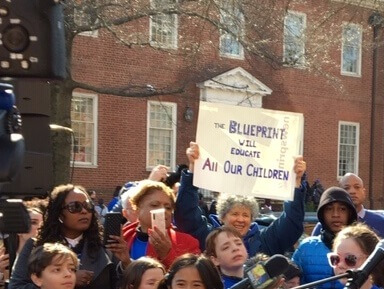
There are loud, passionate and overdue calls these days for more equity throughout our society. But it isn’t only police departments that need to be re-imagined. So do public schools, as recognized by the Kirwan Commission and the transformational Blueprint for Maryland’s Future.
Still, the future of Maryland’s Future is up in the air because of Gov. Larry Hogan’s veto and the fiscal fallout from the pandemic. The Blueprint must be revised, but the good news is that we can seize the moment to expose and confront the clash between economic class and race interests that impedes school reform.
It’s a conflict that has raged throughout our nation’s history. Is the highest priority to close the achievement gap – that is, to enable low-achieving students who are predominantly poor and of color to meet common academic standards? That goal is often called “equity.” Or is the goal to enable students to maximize their potential and surpass common standards? That goal is often referred to as “excellence” for all.
As a state and nation, we shouldn’t have to choose between them. Excellence for all would be the reform tide that lifts all students. But, as we all know, excellence isn’t happening. And equity – prioritizing the interests of students who are poor and of color – has too often lost out.
At the state and local levels, in Maryland and elsewhere, the conflict rears its insidious head in the competition over scarce school funding. Should certain programs – for example, for preschool, summer school and smaller class sizes – be provided for all students, even though extensive research shows that the benefits accrue mainly to students who are poor and of color?
The Kirwan Commission and the General Assembly, in enacting the Blueprint, aimed, with high hopes and the best of intentions, on excellence for all. In doing so, the commission went beyond its primary mission which was to update the 2002 Thornton plan and bring Maryland into compliance with the state constitutional mandate for adequacy. Adequacy, thus defined, is synonymous with equity.
Unfortunately, the Blueprint framers were politically constrained in how much funding they felt able to recommend for excellence or equity. Despite the governor’s howl over the $4 billion cost per year in a decade or more, that averages to a small annual increase in state funding.
It’s also a very small percentage of state revenues, even after factoring in the revenue slowdown caused by the pandemic. Yet, from day one of their deliberations, legislative leaders had to trim their fiscal sails because of the governor’s vehement opposition to adequate funding.
Moreover, there was another less visible reason for their political reticence. They also had to corral votes from legislators, even liberal ones, whose constituents across the economic class spectrum want reform benefits for their kids, too. And now, in the wake of the pandemic, all parents want costly catch-up instruction for their children. No one can blame them, whatever their income or color.
So, when Blueprint funding is revised and no doubt curtailed, is it realistic to expect that equity will receive the highest priority? Will legislative leaders be up to the challenge of assuring, first and foremost, an adequate and equitable safety net for students who need it the most during the long and uncertain transition to implementation of the Blueprint?
Even before the pandemic, the ACLU claimed, in a pending lawsuit in the Circuit Court of Baltimore City, that the Blueprint did not satisfy the court’s prior rulings requiring adequate school funding under the Maryland Constitution.
I think there is hope.
If legislators and all of us – whatever our economic class and race – are truly committed to take action in the spirit of the George Floyd and Black Lives Matter movements, equity will prevail in the school funding battles that lie ahead.
— KALMAN R. HETTLEMAN
The writer is a member of the Maryland Commission on Innovation and Excellence in Education – the Kirwan Commission — a former Baltimore City School Board member, a former deputy mayor of Baltimore and a former Maryland secretary of Human Resources.
Did someone forward this to you?
Get your own daily morning news roundup in your inbox. Free. Sign up here.




 Creative Commons Attribution
Creative Commons Attribution